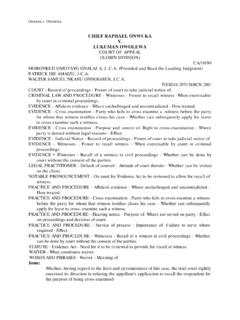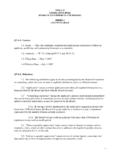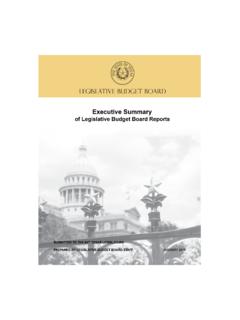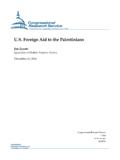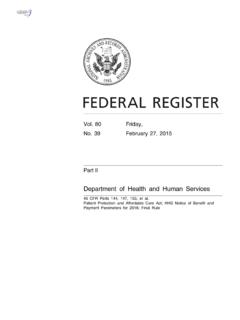Transcription of SEPARATION 1999 CONSTITUTION OF THE - Yusuf Ali
1 SEPARATION OF POWERS UNDER THE 1999 CONSTITUTION OF THE FEDERAL REPUBLIC OF NIGERIA: A CRITICAL REVIEW BY Yusuf 0. ALl (SAN)* INTRODUCTION There is no gainsaying the fact that the famous doctrine or principle of SEPARATION of powers is as old as man, what we are saying in essence is that, SEPARATION of powers has been in existence since man came to the society. It is apposite to state that the doctrine of SEPARATION of powers was in existence arid strictly observed in this country before the advent of the British. This foregoing position can be demonstrated when a recourse is made to the old Oyo empire, where there were in existence the Alarm, Oyo Mesi, the Ogboni among other traditional title holders who took charge of the administration of the said empire. There was a manifest undoubted SEPARATION of powers between the Alafin who was the head, the Oyo Mesi, and the Ogboni, this brought about the necessary checks and balances, so that power is not concentrated in the hands of the Alafin, which is capable of being misused or abused.
2 The doctrine of SEPARATION of powers as practiced by the then Oyo- empire was premised on the YORUBA Adage which say that: (I) Agbajowo Lafi nsoya, ajeje owo kan ko gberu don. (ii) Akil fee mefi Laba Alade eni fojesu koni mumi. (iii) Enikan kiije awade, Igi kan kole da igbo Se. Meaning that, no man is an island to himself and cannot be all in all. The point we are trying to drive home is that, the principle of SEPARATION of Powers is not strange to the African society and therefore, the principle can not be said to be imbibed or imported from the white man but in its formalized theoretical notion it is an imported value into our body polity. HISTORICAL DEVELOPMENT OF MODERN THEORY OF SEPARATION OF P0 WERS. Any system of government that is hinged on the Rule of law and Democracy and especially the presidential system of government as practiced in Nigeria must consist of the three great arms of government,: namely, the Executive, the Legislature and the Judiciary.
3 As rightly pointed out by Aihe in his book1 that such a division of labour is a condition precedent to the supremacy of the Rule of Law in any society. The principle of SEPARATION of powers as it is known today was propounded by Montesquieu who derived his inspiration from Locke s writings and the study of the eighteenth century English CONSTITUTION . The basis of the principle of SEPARATION of powers was given by Locke in his second Treatise of Civil Government as follows:- It may be too great a temptation to human frailty, apt to grasp at power, for the same persons who have the power of making laws, to have also in their - hand the power to execute them, whereby they may exempt themselves from obedience to the laws they made and suit the law, both in its making and execution, to their own private - advantage.
4 2 In the same vein, Montesquieu postulated that Political Liberty is be found only when there is no abuse of power. But constant experience shows every man invested with power is Iiable to abuse it, and carry his authol 4 as far as it will go. To prevent this abuse, it is necessary from the nature of things that one power should be a check on when the legislative and Executive powers are united in the same person or body there can be no Again there is no liberty if the judicial power is not separated from the legislative and executive.
5 There would be an end of everything if the same person or body, whether of the nobles or the people, were to exercise all the three powers. 3 It is worthy of note that the principle of SEPARATION of powers was not in operation in his country France at that time, even up till today the executive and legislative functions are concentrated in the hands of the same group of people in France. However, the American CONSTITUTION practicalised the theory of SEPARATION of powers. In other words, it was fully adopted in the Untied States of America. This is in contradistinction with the British CONSTITUTION where there is no such clear cut SEPARATION of powers. A Nigerian renown constitutional lawyer Professor Nwabueze while emphasising the importance of the principle of SEPARATION of powers says.
6 - Concentration of governmental powers in the hands of one individual is the very definition of dictatorship end absolute power is by its very nature arbitrary, capricious and despotic Limited government demands therefore that the organization of government should based on some concept of structure, whereby the functions of law- makings, execution and adjudication are vested In separate agencies, operating with separate personnel and procedure.
7 We are not prepared, write Vile, to accept that government can become, on the ground of efficiency , or for any other reason, a single undifferentiated monolithic structure, nor can we assume that government can be allowed to become simply an accidental agglomeration of purely pragmatic By separating the function of execution from that of the law-making, by insisting that every executive action must, in so far at any rate as it affects an individual, have the authority of some law, and by prescribing a different procedure for law making the arbitrariness of executive action can be effectively checked. 4 Therefore, in the light of the above, SEPARATION of powers can be succinctly put mean, the exercise of three distinct functions of government by the three arms same without undue meddlesomeness and/or unnecessary interference in the affairs of another in order to ensure the desired checks and balances government SEPARATION OF POWERS UNDER THE PREVIOUS NIGERIAN CONSTITUTIONS It is our opinion that a review, of the , SEPARATION of powers under the 1999 CONSTITUTION cannot be effectively carried out without a recourse to the previous constitutions, like the 1960 Independent CONSTITUTION , the Republican CONSTITUTION of 1963 and the 1979 CONSTITUTION .
8 - The foregoing becomes necessary in view of the fact that, we need to go down the memory lane, at least to take a cursory look into the past in a bid to B understand the present and the future. And as the great Cicero rightly says to be ignorant of the past is to forever remain a child . Therefore, to do justice to this discourse, an attempt will be made t examine the priicipJe of SEPARATION of powers as entrenched in those constitutions aforementioned viz-a-viz its effectiveness at that point in time. To achieve this, we shall examine the topic under the two headings viz:- the period of military Regimes and Civilian Regimes. MILITARY REGIMES (1966-1998) It is commonplace that, the first assignment, usually undertaken by military dictators immediately they usurp power by that unconventional means, was to put some parts of the CONSTITUTION in abeyance, regardless of the ways or procedures laid down in the CONSTITUTION for its amendment.
9 This attitude is only to demonstrate that the successive military regimes in Nigeria considered the principle of SEPARATION of powers as an aberration during their tenure of office, prima facie, the military regimes combine both legislative and executive powers in themselves. It is noteworthy also that, the military not only combined both the Executive and legislative powers but also frustrated the judiciary and apparently rendered same ineffective whenever in -power, destite the iudicial powers vested on them under the various constitutions. The rnhl4tary cQsai and arrogantly took a swipe at the judiciary by the promulgation o Decrees purporting to oust the jurisdiction of. the Courts and in effect prevertthe courts from exercising the powers and/or duties conferred on them by the grundnotm that is the CONSTITUTION .
10 The position enunciated above, was raphifly demonstrated by Professor Nwabueze in his lecture tagged 199 Guardian Lecture where he stated thus:The absolute power is, expectedly being exercised aut cratically.,, In the first era of Military rule, 15 Jan uary, 1966 to 30 September, there were 50 Decrees and 14 between 1 January, 1984 and 15 May, 1985 which explicitly made the constitutional guarantee of fundamental rights inapplicable in relation to any matter- arising under those Decrees, and no Court is to enquke into the question whether a guaranteed right has been or is being or will be contravened by any th ?
